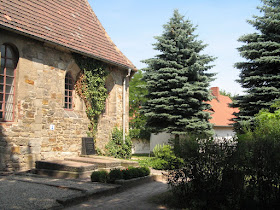
Lutheran parish church in Röcken: Altar
Röcken is the birthplace and burial ground of Nietzsche: The photograph above is of the altar of the Lutheran Church in Röcken.
The photograph shows the altar of the small parish church in Röcken, where Nietzsche's father was minister of the Lutheran Church until his death in 1849. Note that above the table of the altar there is the preacher's pulpit, and nothing else. The Word has replaced all the Icons.
At the root of Nietzsche's perspectivism lies the genealogical evolution and the historical malleability of the Word. Nietzsche grew up under the influence of the Word, as preached from this pulpit by his father, at the small Lutheran parish church of Röcken. His philosophy is a perpetual re-evaluation of the Word he heard before this altar.

"I am the Alpha and the Omega. The First and the Last." Book of Revelations, 22.13" (Wood panel in the Parish Church of Röcken)
The psychoanalyst and historian Erik H. Erickson wrote the following, in his book Young Man Luther, (Norton, 1962 pb ed., p. 107):
"After 1505 Luther had made no bones about the pernicious influence which “rancid Aristotelianism” had had on theology. Scholasticism had made him lose faith, he said; through
Portrait of Martin Luther, painted by the Protestant painter Lucas Cranach, and now at the Schlossmuseum in Weimar.
Nietzsche, as a little boy, listened to the Word from the pulpit at Röcken. His intellectual path thereafter, a long departure from Martin Luther's teachings, was a journey from believing to understanding, from the ear to the eye, from listening to looking, from Luther and Paul to the ancient Greeks in the Lyrical Age of Tragedy, discovered as a student of Prussian 'Bildung' and in his boarding-school at Schulpforta, where he first saw all the color of Hellenism while distinguishing himself as a Classics scholar. And along that path he lost the Faith of his father.

Röcken, in Sachsen-Anhalt. The church tower is visible in the center-left of the photograph.
Below: Approach to Röcken. The church tower is visible above the trees in the center-right of the photograph.
[right-click on images and open link in new window to enhance the size of the picture]

The Parish Church in Röcken:

The tower


Nietzsche's gravesite next to the church, and next to that of his father.
Interior of the Church in Röcken:

Gravestones of local worthies, no doubt awesome to the little boy.

Wood panels and organ at the rear of the parish church of Röcken. Nietzsche's first exposure to music.

Tomb of Nietzsche next to the Röcken Parish Church
Nietzsche's birthplace

Nietzsche's birthplace: Pfarrerhaus




"My father born in 1813, died in 1849. Previous to taking over the pastorship of the parish of Röcken not far from Lützen he lived for some years at the Castle of Altenburg where he had charge of the education of the four princesses. His pupils are the Queen of Hanover, the Grand Duchess Constantine, the Grand Duchess of Oldenburg and the Princess Theresa of Saxe-Altenburg. He was full of loyal respect for the Prussian King Frederick William the Fourth from whom he obtained his living at Röcken; the events of 1848 saddened him immensely. As I was born on the 15th of October, the birthday of the king above mentioned, I naturally received the Hohenzollern names of Friedrich Wilhelm. There was in any case one advantage in the choice of this day: my birthday throughout the whole of my childhood was a day of public rejoicing." (Nietzsche, Ecce Homo).




No comments:
Post a Comment